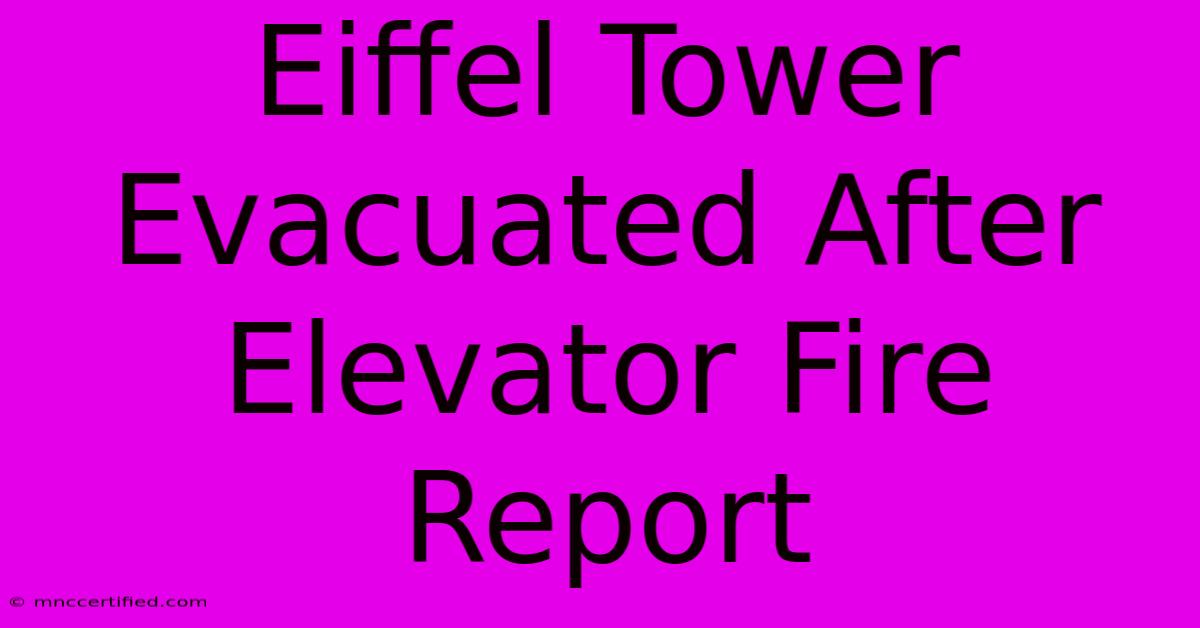Eiffel Tower Evacuated After Elevator Fire Report

Table of Contents
Eiffel Tower Evacuated After Elevator Fire Report: A Detailed Account
The Eiffel Tower, a global icon and a symbol of Paris, experienced a significant disruption recently when it was evacuated following reports of a fire in one of its elevators. This event sparked widespread concern and highlighted the importance of safety protocols in high-traffic tourist attractions. This article delves into the details surrounding the evacuation, exploring the potential causes, the response of authorities, and the subsequent impact on visitors and operations.
The Incident: A Timeline of Events
Reports of a fire in an elevator within the Eiffel Tower emerged on [Insert Date of Incident]. The exact time of the initial report remains slightly unclear, with varying accounts from news agencies and eyewitnesses. However, it's understood that the alarm was triggered relatively quickly, initiating a swift and organized evacuation process.
Evacuation Procedures and Visitor Response
The evacuation was reportedly carried out smoothly and efficiently, with staff directing thousands of visitors away from the structure. Eyewitness accounts describe an atmosphere of controlled urgency, with visitors generally exhibiting calm and cooperation. Efficient emergency procedures played a critical role in ensuring the safety of all those present. The speed and orderliness of the evacuation highlight the importance of regular safety drills and preparedness planning for high-capacity tourist sites.
Fire Department Response and Investigation
The Paris fire department responded rapidly to the incident, deploying a significant number of firefighters and emergency vehicles. Upon arrival, they immediately initiated an investigation to determine the source and extent of the reported fire. While the initial reports suggested a fire, further investigation is needed to confirm the exact nature of the incident and whether it truly involved flames or was simply a malfunction resulting in smoke. The cause of the reported fire is currently under investigation, with potential factors such as electrical faults or mechanical issues being explored.
Impact on Tourism and Operations
The temporary closure of the Eiffel Tower following the reported elevator fire had a significant impact on tourism. Thousands of visitors were affected, with many experiencing delays and disruptions to their sightseeing plans. The closure, while temporary, caused substantial inconvenience and led to rescheduled tours and frustrated travelers. Eiffel Tower ticket holders experienced varying levels of disruption, ranging from minor delays to complete cancellations, depending on the timing of their visit.
Communication and Transparency
The authorities responsible for the Eiffel Tower's operation were commended for their swift communication concerning the incident. They provided regular updates through official channels, keeping the public informed about the situation's progress and the projected reopening time. Effective communication during emergencies like this is crucial to maintain public trust and manage expectations effectively.
Lessons Learned and Future Implications
The incident serves as a crucial reminder of the potential risks associated with large-scale public structures, especially those that rely heavily on complex mechanical systems like elevators. This event underscores the need for rigorous safety inspections, regular maintenance, and prompt responses to any potential hazards.
Moving forward, the Eiffel Tower management will likely review and potentially enhance existing safety protocols. Investing in cutting-edge safety technologies, strengthening emergency response plans, and refining communication strategies will be crucial to prevent similar incidents in the future. This incident serves as a case study for other major tourist attractions worldwide, highlighting the importance of proactive safety measures.
Keywords:
Eiffel Tower, elevator fire, evacuation, Paris, safety, emergency response, tourism, tourist attraction, fire department, incident report, safety protocols, visitor safety, emergency procedures, Eiffel Tower closure, investigation, impact on tourism, communication, transparency, lessons learned, future implications, Eiffel Tower tickets.
(Note: Remember to replace "[Insert Date of Incident]" with the actual date of the incident you are writing about.)

Thank you for visiting our website wich cover about Eiffel Tower Evacuated After Elevator Fire Report. We hope the information provided has been useful to you. Feel free to contact us if you have any questions or need further assistance. See you next time and dont miss to bookmark.
Featured Posts
-
Christmas Dining Jackson Tn Restaurants
Dec 25, 2024
-
Christmas Eve Tv Home Alone Is On
Dec 25, 2024
-
Mega Millions 1 7 M Win In Lemoore Ca
Dec 25, 2024
-
A Christmas Story Stage Review
Dec 25, 2024
-
Snl Stars Rejected Home Alone Role
Dec 25, 2024